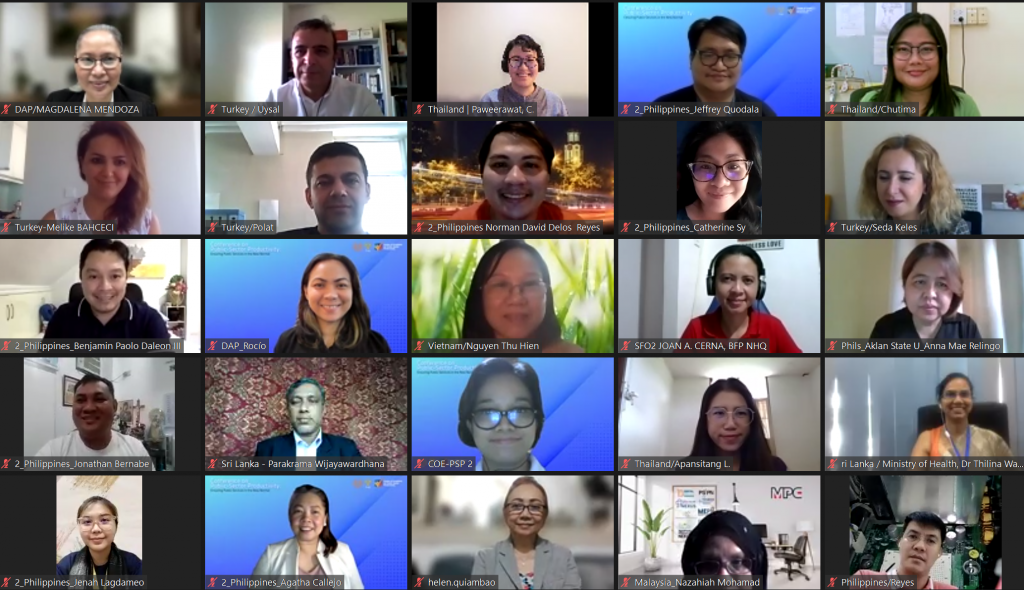The public sector must adopt more dynamic strategies and mindsets and continue delivering effective services in the face of fiscal and regulatory constraints. This was the call of the Conference on Public Sector Productivity, organized by the Development Academy of the Philippines (DAP) in partnership with the Asian Productivity Organization (APO), last August 25, 2021.
Through presentations and a panel discussion, the conference tackled alternative workplace and service delivery strategies, measurement and management of work productivity, and nurturing a productivity mindset in the new normal.
Over 3,700 participants made up of policymakers and government officials, representatives of government enterprises, and staff of public-sector organizations and research institutions watched the livestream through Zoom, Youtube, and Facebook. Participants also included 181 international delegates from Bangladesh, Cambodia, Fiji, India, Indonesia, the Islamic Republic of Iran, Malaysia, Pakistan, the Republic of China, Sri Lanka, Thailand, Turkey, and Vietnam.
APO Secretary-General Dr. AKP Mochtan and APO Director for the Philippines, Undersecretary Jose Miguel R. De La Rosa both emphasized the need to leverage the available digital platforms because of the multifaceted impact of the pandemic Aside from highlighting productivity and innovation, Senator Juan Edgardo Angara added that public sector professionals should perform their duties to the best of their ability and go beyond the call of duty if they can.

Dynamism, Flexibility for Service Continuity
In South Korea and Malaysia, the public sector used regulations and digitalization to ensure continued functioning despite the pandemic.
Using public-private data for their Covid-19 Response System, the South Korean government was able to easily detect the location of the patients for effective contact tracing. Data-sharing was also used in their Mobile Vaccine Reservation in cooperation with the leading messaging service in the country, Kakao Talk, making it easier, faster, and more accurate. Through this, the citizens can also easily access information if there are leftover vaccines.
The Malaysia Productivity Corporation (MPC) ensured productivity gains through the integration of regulatory facilitation and digitalization between public and private players. The digitalization of their procurement system diminished the use of hardcopy documents and enabled better tracking of the application process. Increased productivity and flexibility were noted because of the use of online meeting platforms as well as limitless educational possibilities with a full subscription to online platform learning. The transformation from physical seminars to online webinars boosted the number of participants as they can participate from all around the globe. Companies can receive certification from MPC faster and at a lower cost through an online self-assessment mechanism.
One of the public sector’s major stumbling blocks during a crisis is that it does not anticipate and innovate enough. The architecture of system thinking, innovation and foresight functions will enable efficient governance approaches in the new normal, according to Dr. Piret Tõnurist of the Organisation for Economic Co-operation and Development (OECD). Using Anticipatory Innovation Governance, organizations can foresee various futures and explore options. The framework requires an authorizing environment with networks and partnerships, public participation, vested interests, legitimacy, evidence evaluation, and learning loops to develop policies for complex and uncertain contexts.
The framework pushes governments to challenge the status quo by asking the following questions: Should governments rely on crises to make technology, solutions, and innovations within the public sector possible? What other processes, tools, and methods can organizations use continuously to improve its processes? What behavioral, organizational, and institutional drivers within organizations will drive innovation?
Innovation and COVID-19 Responses
Partnerships are the great enabler for the Office of the Vice President of the Philippines (OVP) pandemic response programs. By working with the private sector, they were able to expand their reach and multiply their efforts making their presence felt throughout the country. By working with local government units, the online application market service Community Mart, improved the income of market vendors and tricycle drivers while having less exposure to customers. Volunteers paved the way for the Bayanihan E-Konsulta, a free teleconsultation service that aims to help decongest hospitals in Metro Manila.
In Makati City, the Makatizen application and card served as lifelines for residents who needed government support and emergency services. The Makatizen Card is a multipurpose card that allowed the Makati government to transfer financial assistance to its constituents, and enabled citizens to make electronic purchases. The Makatizen app offered a platform where users can access the latest announcements from the city government and offered access to the proper authorities for any emergency that requires urgent government assistance and intervention. Technology aided new possibilities in addressing the demands of governance under the new normal.Education should continue despite the challenges of internet-based/blended learning through the establishment of community learning hubs, which serves multiple school-age children, rather than trying to ensure that each household has a device or internet service.
For his closing remarks, DAP President and Chief Executive Officer, Atty. Engelbert Caronan, Jr. relayed that pushing for productivity, innovation, and foresight in the public sector is not a matter of perspective anymore, and the government’s capacity to respond effectively and efficiently to the current and emerging concerns of the people should be a given. According to him, the government must be agile and must assume that we have to hurdle the digital divide on behalf of our clients, instead of them having to invest in additional resources to access our services. And lastly, he imparted that every organization’s quest for productivity should consider the effects their interventions have on the lives of the people they serve.
